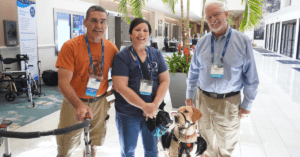
NAF is proud to feature Felicia Williams as a recipient of NAF’s 2020 Diverse Scientists in Ataxia Pre-Doctoral Research Fellowship. Felicia developed a new method to identify genes that suppress protein clumping.
Bio:
Felicia Williams graduated from the University of Georgia in 2019 where she studied genetics and biotechnology. Here she began her research career at the USDA Agricultural Research Service in the lab of Scott Gold working on fungal plant diseases of corn. She currently attends Duke University in the lab of Matt Scaglione where she researches protein maintenance in microorganisms with support from the NAF Diverse Scientists in Ataxia Research Pre-Doctoral Fellowship.
Lay Summary:
A number of spinocerebellar ataxias (SCAs) including SCA1, SCA2, SCA3, SCA6, SCA7, and SCA17 are caused by presence of an expanded tract of the amino acid glutamine in specific proteins. In these diseases, these long polyglutamine tracts cause proteins to clump up and disrupt brain cell function, ultimately resulting in neurodegeneration. Therefore, one potential way to treat these diseases is to prevent this protein clumping phenomenon. In my PhD laboratory, we realized that an amoeba naturally had thousands of polyglutamine tracts, and we found that this organism is naturally resistant to this polyglutamine protein clumping. We next wanted to identify how this amoeba resists protein clumping. To streamline this process, I developed a new method to identify genes that suppress protein clumping in this amoeba. Using this method, I hope to identify how nature has prevented protein clumping. This information will then be used to aid in developing therapies to treat diseases including SCAs.
















